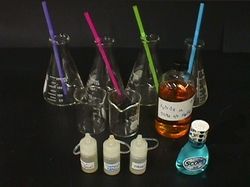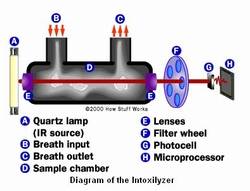 American Airlines kept an as-yet-unnamed pilot
from his plane in Little Rock (AR) on Monday, after a security
agent said he smelled alcohol (and mint) on the pilot's breath.
American Airlines kept an as-yet-unnamed pilot
from his plane in Little Rock (AR) on Monday, after a security
agent said he smelled alcohol (and mint) on the pilot's breath.
The pilot was reportedly taken away to the county jail, after
pasing a field sobriety test; and he was given a BAC test. He was
said to have blown .004%, 1/10 the FAA's limit, and 1/5
American's.
Passengers were delayed some three hours, nearly enough time to
drive to their St Louis destination, as the pilot was still not
allowed to fly the airplane.
How could this happen?
 We wondered a lot of things, and we asked a lot of
folks. "Is there any common way to give a test result of .004%,
without having consumed something alcoholic?" we asked some friends
in medicine. One highly-qualified flight surgeon told us,
"Yes-biological variation in the test result. A negative
result could well be in the range 0-5. The presence of
0.4mg% (ie. 0.4mg alcohol per 100ml blood) could easily be within
the 'clutter' around zero. For example, the limit here for driving
is 80mg%. Any attempt to claim that this pilot was unsafe at 0.4 is
clearly ludicrous." There's more to it than that, though:
"However," he continued, "the pilot may have been 'hung over,' and
there is no way of measuring this, apart from subjective feeling of
ill health. In order to interpret this result you need to know
whether he was drinking the night before."
We wondered a lot of things, and we asked a lot of
folks. "Is there any common way to give a test result of .004%,
without having consumed something alcoholic?" we asked some friends
in medicine. One highly-qualified flight surgeon told us,
"Yes-biological variation in the test result. A negative
result could well be in the range 0-5. The presence of
0.4mg% (ie. 0.4mg alcohol per 100ml blood) could easily be within
the 'clutter' around zero. For example, the limit here for driving
is 80mg%. Any attempt to claim that this pilot was unsafe at 0.4 is
clearly ludicrous." There's more to it than that, though:
"However," he continued, "the pilot may have been 'hung over,' and
there is no way of measuring this, apart from subjective feeling of
ill health. In order to interpret this result you need to know
whether he was drinking the night before."
 What
about other things? Could a recently-'installed' set of dentures,
that had been sitting overnight, fool the machine? What about the
simple act of using mouthwash? We called Procter and Gamble, makers
of Scope; but there wasn't anyone there who was able to go on the
record. A Pfizer (Listerine) spokesman told us that proper use of
their (26.9% alcohol) mouthwash could render a breathalyzer result
that would show the suspect was over the legal driving limit, even
ten minutes later. How long would it take, from the proper use of
the mouthwash, until a level just 1/20 of that would show up? He
didn't know; he'd have to have 'someone from legal' get back to
us.
What
about other things? Could a recently-'installed' set of dentures,
that had been sitting overnight, fool the machine? What about the
simple act of using mouthwash? We called Procter and Gamble, makers
of Scope; but there wasn't anyone there who was able to go on the
record. A Pfizer (Listerine) spokesman told us that proper use of
their (26.9% alcohol) mouthwash could render a breathalyzer result
that would show the suspect was over the legal driving limit, even
ten minutes later. How long would it take, from the proper use of
the mouthwash, until a level just 1/20 of that would show up? He
didn't know; he'd have to have 'someone from legal' get back to
us.
We had another question for our experts: Is there likely any
reliability to a number that low, on the equipment typically
available at major US airports or police stations? The answer we
received, unanimously, from industry and the medical field, was,
"no."
We got the same, unequivocal answer (from the doctors), when we
asked if a BAC of .004% could impair a pilot's abilities, in any
measurable way. "No." In fact, we found that other physiological
circumstance or condition (missing an hour's sleep, for instance)
could commonly produce similar, or worse results, than having a BAC
of .004%
 But... if the pilot weren't drunk, how did the
"agent" smell booze? One respondent (a qualified medical man) told
us, "In the course of my duties I have often examined Airmen who
have smelt strongly of alcohol but have a BA of zero. They are
hungover from the night before. I have advised on occasions that
they are unfit for duty because of their hangover." Since we don't
know what the pilot was doing the day before, we just can't
say...
But... if the pilot weren't drunk, how did the
"agent" smell booze? One respondent (a qualified medical man) told
us, "In the course of my duties I have often examined Airmen who
have smelt strongly of alcohol but have a BA of zero. They are
hungover from the night before. I have advised on occasions that
they are unfit for duty because of their hangover." Since we don't
know what the pilot was doing the day before, we just can't
say...
We also queried American Airlines, DavTech (makers of an
infrared-technology "Intolilyzer") and Draeger (who make the
Breathalyzer® -- yes, it's a trademark), to add to the story.
None could get back to us, in time for our deadline last night.
It's an interesting story, and leaves the headline question
largely unanswered. We'll undoubtedly get more comments and
opinions on this one. Expect a followup.
 Aero-News: Quote of the Day (12.18.25)
Aero-News: Quote of the Day (12.18.25) Classic Aero-TV: Viking Twin Otter 400--Bringing the DHC-6 Back Into Production
Classic Aero-TV: Viking Twin Otter 400--Bringing the DHC-6 Back Into Production NTSB Final Report: Rans Employee Flying Club Rans S-6ES Coyote II
NTSB Final Report: Rans Employee Flying Club Rans S-6ES Coyote II ANN FAQ: Submit a News Story!
ANN FAQ: Submit a News Story! ANN's Daily Aero-Term (12.18.25): Braking Action Advisories
ANN's Daily Aero-Term (12.18.25): Braking Action Advisories





